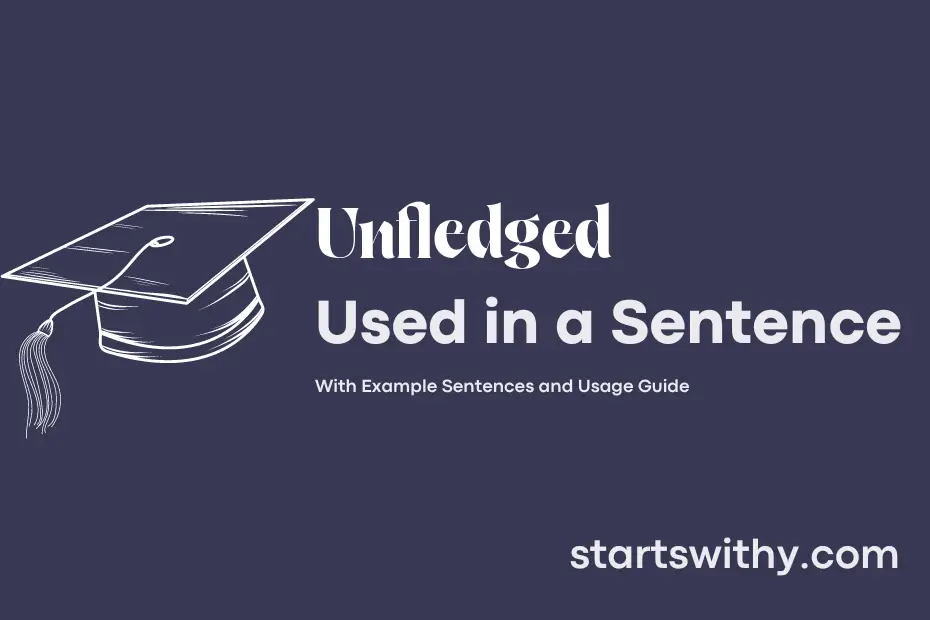Have you ever come across the term “unfledged” in your reading and wondered what it meant? In essence, “unfledged” refers to something or someone that is inexperienced, underdeveloped, or not fully developed. This word is often used to describe things that are still in a beginner or novice stage.
When encountering the term “unfledged” in a sentence, it serves to highlight a lack of maturity or readiness in a person, animal, or situation. Keep an eye out for this word in your future reading, as it can provide insightful context about the level of development or experience being described.
7 Examples Of Unfledged Used In a Sentence For Kids
- The little bird was still unfledged and couldn’t fly yet.
- It is important to protect unfledged birds in their nests.
- The unfledged chicks chirped loudly for their mother’s attention.
- The unfledged eaglet had fluffy feathers all over its body.
- We need to be patient and gentle with unfledged baby animals.
- The unfledged duckling followed its mother wherever she went.
- The unfledged owlet blinked its big eyes in the dark nest.
14 Sentences with Unfledged Examples
- Unfledged students often feel overwhelmed during their first year of college.
- It is normal for unfledged undergraduates to struggle with time management.
- Many unfledged individuals entering college experience homesickness.
- Despite being unfledged, college students are expected to take on a variety of responsibilities.
- Unfledged freshmen may find it challenging to adjust to the academic rigor of college.
- It is common for unfledged undergraduates to seek guidance from seniors.
- Unfledged students often struggle to navigate the complexities of campus life.
- College can be a daunting environment for unfledged students.
- Unfledged students are encouraged to participate in extracurricular activities to enhance their college experience.
- It is important for unfledged individuals to prioritize their mental and physical well-being in college.
- Unfledged students may face peer pressure to engage in unhealthy behaviors.
- Building a support network is crucial for unfledged college students.
- Unfledged undergraduates may feel a sense of imposter syndrome in their classes.
- The transition from high school to college can be especially challenging for unfledged students.
How To Use Unfledged in Sentences?
To use Unfledged correctly in a sentence, you need to understand its meaning and how it can be used in context. Unfledged is an adjective that describes something or someone as immature, inexperienced, or not fully developed. Here is a guide on how to incorporate Unfledged into a sentence:
-
Identify the context: Think about a situation where you want to describe something as inexperienced, immature, or underdeveloped.
-
Choose the right subject: Select a subject that fits the criteria of being Unfledged.
-
Formulate your sentence: Structure your sentence in a way that accurately conveys the meaning of Unfledged. For example, “The new student displayed unfledged skills in his first art class.”
-
Revise if needed: Make sure the sentence flows well and effectively communicates the concept of immaturity or lack of experience.
By following these steps, you can effectively use Unfledged in a sentence. Practice using the word in different contexts to become more comfortable with incorporating it into your vocabulary. Remember, using new words like Unfledged can enhance your writing and communication skills, so don’t hesitate to experiment with it.
Conclusion
In conclusion, sentences with the keyword “unfledged” often describe things that are undeveloped, immature, or inexperienced. These sentences convey a sense of newness, inexperience, or lack of readiness. Examples such as “The unfledged actress struggled to land her first major role” or “The unfledged bird hesitated at the edge of the nest before taking its first flight” illustrate this concept. By using this keyword in sentences, writers effectively communicate the idea of something being not yet fully formed or prepared.
Overall, sentences with “unfledged” highlight a state of being at the beginning stages of growth or development. These sentences help convey a sense of inexperience or immaturity, enriching descriptions and enabling readers to better understand the early stages of various processes or entities.



